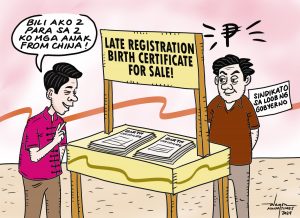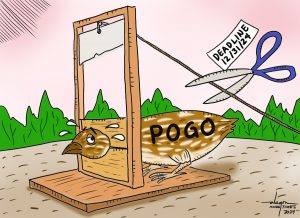
IT’S barely a little over one week and the official campaign period for candidates of elective positions will be off to a start. But even before this there are already candidates who are campaigning in the guise of representing their immediate relatives who are now barred from running under the law.
For example, during the last week-end a son of an outgoing councilor of Davao City’s third district led a group that conducted an “Operation Tuli” in one of the barangays. Naturally the activity gathered a good number of parents-attendees. The parents simply took advantage of the circumcision of their male children done by volunteer medical personnel for free. If was not done in some kind of outreach program, it would have cost them a fortune; unless of course if the parents have the right of passage done through the traditional way which is the common practice in the rural areas.
The candidate immediate kin of the outgoing councilor was quick in having himself introduced as the forthcoming councilor of the district so the children’s parents will know that he is likely to continue the free “Operation Tuli” once he is seated in the Davao City Council. He was asked later to give a message for and in behalf of his mother but very clearly the theme of his message was already that of a hard campaign speech.
This is without doubt a violation of the election law governing campaigning by candidates. But what can the Commission on Elections (COMELEC) do when the agency does not have the necessary manpower to do policing work especially monitoring candidates’ activities in the rural areas.
But still, we believe, this can be remedied if our poll body officials at the national level will be innovative enough. We all know that on a year-on-year basis the agencies of government including the constitutional bodies like the COMELEC, submit its proposed budget for inclusion in the national appropriations for the entire government operation.
For this purpose why cannot the Commission do what all local governments are doing every year? That is, create as many job order positions so that the Commission will be provided opportunity to pool manpower where the agency can draw from every election year. This pool of manpower resources can be tapped by COMELEC as its monitoring personnel to be assigned in the rural areas and they can be deputized to do what is necessary to make candidates accountable for any violation of election laws. And if the agency wants these people resources to be effective in their work the Commission must recruit the job order workers direct from the communities where they have easier and better access.
Without doubt a scheme like this will help a lot the COMELEC succeed in having election laws followed to the letter not only by the candidates themselves but by their rabid supporters as well.
Now can this be done considering the usual lack of financial resources of the government? Well, there is no harm in trying. But again it could be one of the measures of leadership at the said government agency.
****************************
The opposition at the national level has been banding around that the people should not vote for a Presidential candidate whose family stole billions of pesos from the national coffers. Obviously they are referring to Bongbong Marcos Jr. who is the son of the late President Ferdinand Marcos who the anti-Marcos people are claiming until now his surviving family members have succeeded in holding on to the billions that were stashed in different banks.
In fact the Cory Aquino-created Presidential Commission on Good Government (PCGG) despite its claims of successes in recovering the so-called ill-gotten wealth of the Marcoses, only officially got back moneys and properties that were in the names of alleged Marcos cronies, not from accounts in the name of any of the Marcos family members.
Case in point is the so-called ten billion dollars in deposits in Switzerland banks that the PCGG was claiming to have won for the government through an almost endless legal recovery tussle. If indeed the recovery suits were won in Switzerland’s courts how come the banks in that country only returned some $650 million and not the entire amount?
Moreover, are not won recovery cases not enough proof that Marcos indeed stole that much money from the government? How come none of the surviving Marcos family members or even the demised President himself, is not convicted of plunder by a proper Philippine court? And If indeed the late President Marcos plundered the Philippine treasury may be a “posthumous conviction” can already be applied in his particular case.
Levity aside, it really is a source of wonder to us, and perhaps to a lot of Filipinos why, despite all the charges against the Marcoses and the number of years since the post Marcos era governments had been running after him and his family, still none of them get incarcerated for the crime they were supposed to have committed. Instead they only succeeded in having the Marcoses convicted by the court of public opinion. Is the doctrine in law of “beyond reasonable doubt” working in favor of the Marcoses?
For comments and/or reaction to our column we can be reached through our e-mail address at: victorino.sumalinog@yahoo.com; Mobile No. 09392090435; or landline 2372169.


